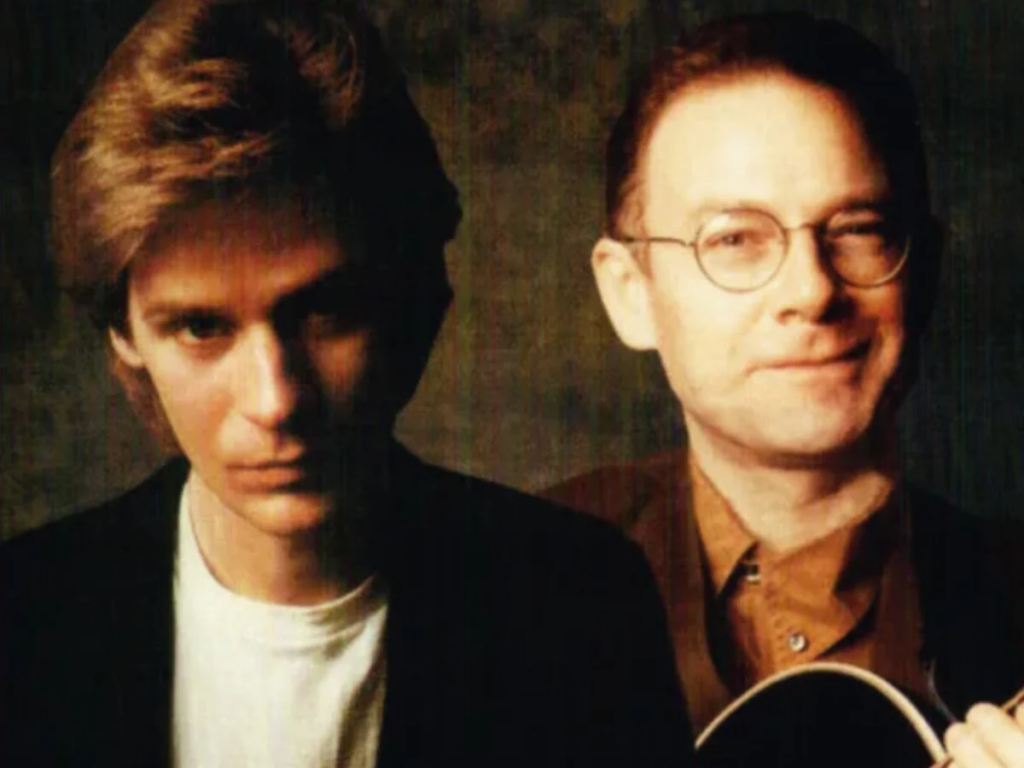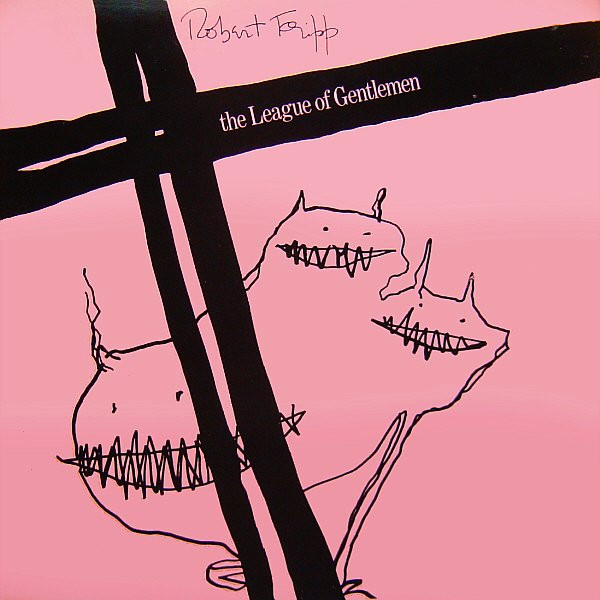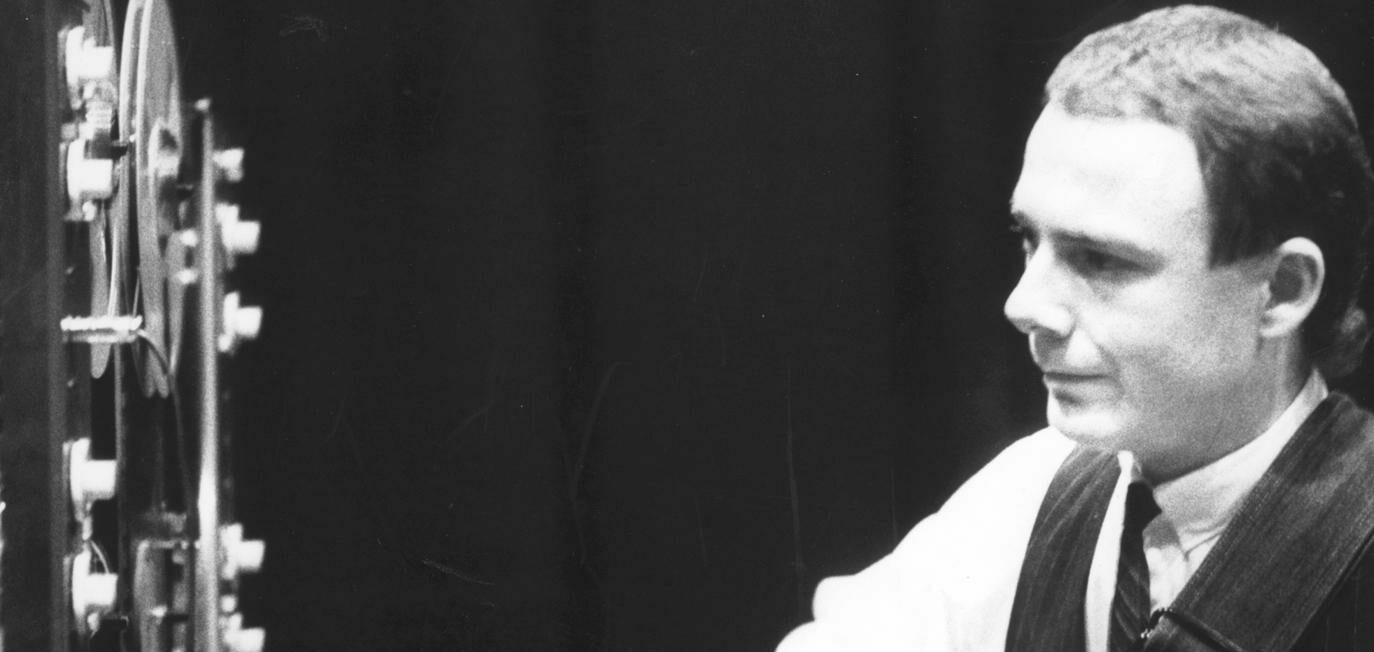Just two weeks prior to the release of their epic ‘power trio’ album Red in October 1974, the third iteration of King Crimson–headlined by John Wetton on lead vocals and bass guitar–unexpectedly disbanded, leaving a dejected Robert Fripp to quit the music business altogether.
He’d soon be lured out of semi-retirement by a number of exciting session work offers, not least of which included an invitation from Brian Eno to participate in the recording of David Bowie’s Heroes album in August 1977–where he contributed the now-iconic guitar part to the title song.
Just a few months prior to the recording of Heroes, Fripp had relocated from the U.K. to New York City’s Hell's Kitchen neighborhood. He quickly became absorbed into the city’s burgeoning punk rock and new wave music scenes, collaborating with local artists such as Blondie, Talking Heads, and The Roches.

I was surprised to learn that during this period, Daryl Hall was among Fripp’s chief collaborators and closest friends. Hall–who had achieved international fame alongside musical partner John Oates by this point–was seemingly disillusioned with the blue-eyed soul/pop style he’d become known for and sought to explore the less-commercial elements of his songwriting.
The two worked together first on Hall’s debut solo album Sacred Songs–recorded in the span of just three weeks at The Hit Factory studio in August 1977–and then on Fripp’s solo outing Exposure (originally titled The Last Of The New York Heartthrobs), released in June 1979.
Fripp would additionally contribute guitar and production duties to Peter Gabriel’s eponymous second album (1978), envisioning the three albums as a quasi-trilogy loosely connected by recurring musical themes (one such example being “NYCNY” from Sacred Songs and "I May Not Have Had Enough Of Me But I've Had Enough Of You" from Exposure sharing the same instrumental backing).
RCA Records, Hall & Oates’ label, was unhappy with the experimental nature of these recordings and took steps to limit Hall’s association with Fripp. Sacred Songs was shelved until March 1980 (thus ruining Fripp's ‘trilogy’ concept), and–despite Hall having completed vocals for the entire album–his contribution to Exposure was narrowed to just two songs: “You Burn Me Up I’m A Cigarette” and “North Star.” To fill in for Hall on the remaining songs, Fripp enlisted the help of Van Der Graaf Generator’s Peter Hammill (“Disengage,” “Chicago”) and Terre Roche of The Roches (“Mary,” “Exposure”).

Fripp was evidently dissatisfied with the released version of Exposure, as several updated and expanded versions of the album have appeared in subsequent decades. It was first reissued in 1985 (the ‘second edition’) and then again in 2006 (the ‘third edition’), both featuring brand-new remixes of the album.
Despite seriously considering forming a new band with bassist Tony Levin (Peter Gabriel, John Lennon) and drummer Jerry Marotta (Tears For Fears, Indigo Girls), Hall and Fripp would ultimately part ways amicably once the new decade rolled around. Levin soon became a core member in the new King Crimson–headlined by Adrian Belew on guitar and lead vocals–who released their acclaimed new wave-infused album Discipline in September 1981.
Fripp and Hall continued to speak highly of each other’s musical prowess in the ensuing decades, with Fripp even appearing as a guest on Hall’s “Live At Daryl’s House” YouTube series in November 2023. The pair performed several tracks from Exposure and Sacred Songs, such as “You Burn Me Up I’m A Cigarette,” “NYCNY,” and “Babs And Babs” together for the first time in over four decades.
In a market oversaturated with box sets and other archival reissues from the major labels, DGM continues to set the standard in this area with both extreme attention to detail and maximum value for the listener. I’ve seen some impressive box sets in my day (most notably, the recent Who’s Next / Life House Super Deluxe Edition), but the massive Exposures set has to rank among the most extensive archival reissues ever put into production.
Exposures essentially serves as a complete document of Fripp’s musical endeavors during the 1975-1981 period in which King Crimson was on hiatus. In addition to the aforementioned first three versions of Exposure, the set includes a lifetime’s supply of ‘Frippertronics’ recordings (Fripp’s unique ambient soundscaping technique, based on a novel tape looping/delay system developed with Brian Eno) plus other associated Fripp solo albums from this period such as 1980’s God Save The Queen/Under Heavy Manners (featuring an uncredited vocal cameo by David Byrne) and 1981’s electronic disco-infused instrumental piece The League Of Gentlemen.
Fans are additionally treated to three more(!) iterations of the Exposure album, remixed from the original multi-track tapes by Steven Wilson. Wilson’s ‘fourth edition’ of Exposure is a faithful remix of the original 1979 release, whereas the ‘fifth edition’ restores all of Daryl Hall’s removed vocal contributions. Finally, Breathless, Or How I Gradually Internalised The Social Reality Of Manhattan Until It Seemed To Be A Very Reasonable Way Of Life is yet another alternative presentation of the album again featuring Hall’s vocals and a different running order.

The set contains a wealth of immersive content spread across two of the five included Blu-Ray discs, breaking down as follows:
Blu-Ray 1 (Disc 25):
- Exposure (Fourth Edition) - 5.1 & Dolby Atmos mixes by Steven Wilson
- Exposure (Fifth Edition) - 5.1 & Dolby Atmos mixes by Steven Wilson
- Breathless, Or How I Gradually Internalised The Social Reality Of Manhattan Until It Seemed To Be A Very Reasonable Way Of Life - 5.1 & Dolby Atmos mixes by Steven Wilson
- God Save The Queen - 4.1 mix by David Singleton
- Under Heavy Manners - 5.1 & Dolby Atmos mixes by Steven Wilson
Blu-Ray 4 (Disc 28):
- The League Of Gentlemen - 5.1 mix by Steven Wilson
- Let The Power Fall - 4.1 mix by David Singleton
- Washington Square Church - 5.1 mix by David Singleton
Some of this material–such as the Exposure (Fourth Edition) and Washington Square Church Frippertronics set–has been issued outside the larger box in more-economical CD/DVD editions, but the vast majority of the immersive content (including all the Dolby Atmos mixes) remains exclusive to the Exposures box.

Exposure is a very eclectic album, weaving together disparate threads of punk rock, new wave, ambient electronic soundscapes, and even heavy metal into a unified musical statement. The dynamic contrast between mellow and heavy, often-abrasive passages has always been a hallmark of Fripp’s music, accentuated even more so by the use of different singers throughout the album. Personally, I’m always going to prefer Hall’s soulful musings in “North Star” to Peter Hammill’s raw, caustic delivery throughout “Disengage.” To put it mildly, this is not the most accessible music out there.
Steven Wilson’s excellent work on the King Crimson catalog earned him numerous accolades from fans, so it’s no surprise that his contributions to the Exposures box set are of that same high standard. The Dolby Atmos mixes of Exposure and Under Heavy Manners spread the instrumentation far and wide, utilizing the additional surround and height channels for far more than just ambient reflections.
The opening track “Preface” makes for a fun Atmos demo, with the different a capella voices scattered about the various speakers and Brian Eno’s voice moving between the center & front height speakers. A telephone ringing in the side right channel transitions into the chaotic “You Burn Me Up I’m A Cigarette,” the first of two tracks to feature Daryl Hall on lead vocals. Guitars come screaming from the side surrounds and piano in the rears, while Hall’s voice extends from the center channel up into the heights.

An all-height intro to “Breathless” gives way to crunchy guitars in the side left and rear right speakers, while the drums come thundering in from upfront. This track recalls Wetton-era King Crimson and wouldn’t necessarily feel out-of-place on 1973’s Larks Tongues In Aspic or 1974’s Red. The ending is truly something to behold in Dolby Atmos, with intermittent sound effects swirling all around and the band bombarding the listener from all angles. The low-end sounds absolutely incredible.
More Crimson-esque angular guitar riffs lead us into “Disengage,” featuring Peter Hammill’s distinctive vocals. “North Star'' focuses most of the action at ear-level, with guitars filling up the side channels and Daryl Hall’s double-tracked vocals spread front-to-back. The height channels are reserved solely for a rotating pedal steel(?) and Fripp’s scratch-y ambient guitar effects.
The ‘fifth edition’ appears to use the same mixes as the fourth, except with Daryl Hall’s original vocals substituted in on “Disengage,” “Chicago,” “NY3,” “Mary,” and “Exposure.” While I’m still not a huge fan of the title track, I have to say that I much prefer Hall on “Disengage” and “Chicago” over Hammill. The delicate “Mary” is more of a toss-up, offering compelling vocal performances from both Roche and Hall.

Steven Wilson and King Crimson manager David Singleton split immersive mixing duties for 1980’s God Save The Queen/Under Heavy Manners, with Singleton delivering a 4.1 surround version of the ambient instrumental God Save The Queen while Wilson tackled the “discotronics” Under Heavy Manners in both 5.1 and Dolby Atmos.
David Byrne owns the center speaker throughout “Under Heavy Manners,” while the nearly twenty-minute epic “The Zero Of The Signified” has to rank among the most impressive Dolby Atmos mixes I’ve heard to date. Drums and bass drive the front channels, as the hypnotic arpeggiated guitar patterns fill out the sides and Fripp’s sustained guitar notes slide all around the height array.
Discipline is one of my favorite King Crimson titles, so it’s fascinating to hear that seeds of that album’s style start to form during this era. Hall’s “North Star” feels like an embryonic version of “Matte Kudasai,” while the furious guitar interplay that characterized the Adrian Belew era is all over the League Of Gentlemen album. The second track’s opening stop-and-start bass riff certainly foreshadows “Indiscipline.”

The 5.1 mixes of The League Of Gentlemen album are pretty simple, but effective nonetheless. Fripp’s lead guitar typically stays upfront with the rhythm section, while keyboards and/or a second guitar part are supplied by the rears. That being said: in comparison to other material in the set, the League Of Gentlemen recordings seem to lack some ‘punch’ and high-frequency detail–particularly in the rhythm section, which has kind of a ‘hollow’ quality.
As for the Frippertronics portion of the set: though I’m not a huge fan of ambient music, I have to admit that the surround experience does a lot to enhance these hypnotic, almost-otherworldly recordings. Whereas God Save The Queen and Let The Power Fall are presented in true quad, Washington Square Church–perhaps the most ‘accessible’ of the ambient albums–is a 5.1 mix with Fripp’s live guitar isolated in the center speaker and the pre-recorded tape loops spread about the four corners.
Though the Exposure album is a fascinating example of Robert Fripp’s creativity and versatility as both an artist and producer, I wouldn’t necessarily recommend it as an entry point into the Crimson-verse for new listeners. If this material does happen to be in your wheelhouse, Exposures is an embarrassment of riches and–if nothing else–the deluxe edition box set by which all future box sets should be judged.

